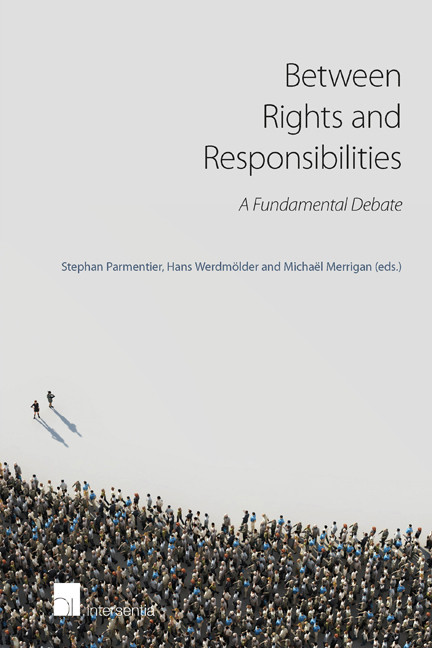Book contents
- Frontmatter
- Foreword
- Contents
- About the Authors
- Introduction: Towards an Integrated Vision of Rights and Responsibilities
- PART I FUNDAMENTAL RIGHTS AND FUNDAMENTAL RESPONSIBILITIES: SETTING THE SCENE
- PART II RIGHTS AND RESPONSIBILITIES IN SPECIFIC CONTEXTS
- Declaration of Human Duties and Responsibilities
Introduction: Towards an Integrated Vision of Rights and Responsibilities
Published online by Cambridge University Press: 22 November 2017
- Frontmatter
- Foreword
- Contents
- About the Authors
- Introduction: Towards an Integrated Vision of Rights and Responsibilities
- PART I FUNDAMENTAL RIGHTS AND FUNDAMENTAL RESPONSIBILITIES: SETTING THE SCENE
- PART II RIGHTS AND RESPONSIBILITIES IN SPECIFIC CONTEXTS
- Declaration of Human Duties and Responsibilities
Summary
‘And so, my fellow Americans: ask not what your country can do for you, ask what you can do for your country. My fellow citizens of the world: ask not what America will do for you, but what together we can do for the freedom of man.’
During his inaugural speech on 20 January 1961, American President John F. Kennedy could not have foreseen that his words would become so famous in the course of the next fifty years. These two sentences have been repeated over and over again, by different people on different occasions, and have also been adapted accordingly. The presidential proclamation that citizens should not limit themselves to claiming benefits and rights from the society they live in, but should also contribute to the development and the well-being of their societies is a very interesting, even provocative one. The core argument, in a nutshell, boils down to the general idea that citizens also have responsibilities, duties and obligations, next to possessing individual rights. In the past half-century this idea has gradually risen to the centre stage of public debate in many western societies, something that Kennedy in the early 1960s could hardly have envisaged.
Some examples of recent debates in several European countries and beyond may illustrate this trend:
– For how long can persons who have lost their job receive unemployment benefits from local or central state agencies, and what kind of responsibility lies with the unemployed themselves? Can they be obliged to search for another job and, if so, under which conditions? Can persons with insufficient professional qualifications who receive benefits be obliged to receive training so as to improve their position on the labour market?
– In what way can public authorities impose obligations on members of non- European linguistic, cultural and religious minorities to comply with the general values and norms of the host country? More specifically, do all citizens have the right to dress the way they wish, or are certain restrictions allowed and on what grounds? Can newcomers, who are dependent on government benefits, be forced to learn the language of the host country and how?
– To what extent can or should the provision (or reimbursement) by the social security system of expensive health care treatments be made dependent on a patient's previous conduct with regard to his or her own health?
- Type
- Chapter
- Information
- Between Rights and ResponsibilitiesA Fundamental Debate, pp. 1 - 10Publisher: IntersentiaPrint publication year: 2016

